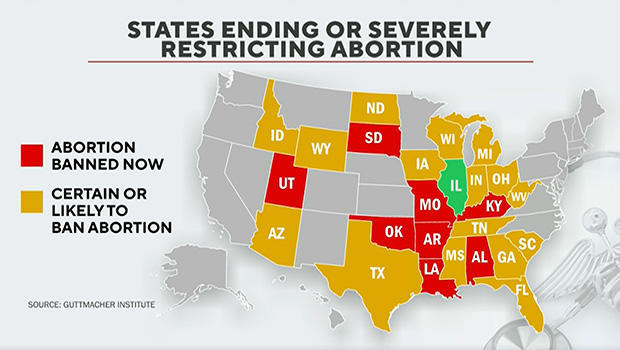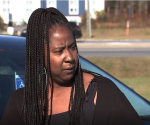Illinois abortion advocates expect influx of patients from out-of-state: “It reinforces my commitment”
[ad_1]
Laurie, who lives north of Chicago, says getting behind the wheel is an act of activism. She drives women who need a ride to get an abortion, both locally and from out-of-state. She volunteers for the Midwest Access Coalition (MAC), a non-profit that helps fund everything from lodging and transportation to childcare for women who need those resources to get the procedure.
Laurie said she’s driven about 20 women in the last three years.
CBS News correspondent Adriana Diaz asked, “What do you remember about the last woman you transported?”
“She was a single mom. She wasn’t getting a lot of support from her former husband. And she said, ‘I just can’t manage it as much as I would like to.’ And it was just, it was heartbreaking, and it was encouraging at the same time that she had an avenue to terminate her pregnancy, because she wanted to and felt she needed to.”
The Supreme Court’s decision striking down Roe v. Wade could create a new wave of pregnant people traveling to states where abortion is more widely available.
Illinois, which has strong abortion protections in place, is surrounded by states that have or could have restrictions on the procedure. With Roe overturned, Planned Parenthood estimates that up to 30,000 additional patients could travel to Illinois for abortions over the next year.
CBS News
Planned Parenthood of Illinois has been preparing for years in case Roe fell, building a facility in Waukegan (about eight miles from the Wisconsin border), and another near Indiana.
Speaking ahead of the Supreme Court’s decision last Friday, MAC’s executive director Diana Parker-Kafka said demand for her organization’s services had already tripled this year. “Like, my phone’s vibrating every five seconds now,” she said.
And she worries that, without Roe, Illinois healthcare facilities would be stretched to capacity.
Diaz asked, “Do you expect people will have to be turned away?”
“Oh yeah. Yeah. There will be people that we won’t be able to see through their abortion care that need it. And we’re also thinking about plans on how to support those people.”
“There are anti-abortion rights activists who believe that it’s wrong to help women cross state lines to get an abortion if she’s coming from a state where it’s banned,” Diaz said. “What do you say to them?”
“I don’t think bodily autonomy should be limited by borders,” Parker-Kafka replied. “These are people making a decision that is really essential for their lives, for their families.”
“Is your organization helping people, women, skirt state laws?”
“I wouldn’t say they’re skirting state laws,” Parker-Kafka said. “If someone has an appointment at a clinic in Illinois and that care is legal, then we absolutely will help them get there.”
And for some volunteers, like Laurie, their passion is personal. She had an abortion in her thirties before she was ready for a family. “I knew immediately that there’s no way I’m going to have a child right now,” she said. “I was lucky it was after Roe. I’m old enough to clearly remember before Roe was passed. And I know what those experiences were like.”
She said ensuring access to safe, legal abortion is what drives her.
“Is it hard dropping folks off?” Diaz asked.
“Yes, yes, it is, it is. I think about them walking through the doors. They stay with me. It reinforces my commitment to keep on doing this as long as necessary – which is looking like it’s gonna be a while.”
It’s not a crime for a woman to travel to another state for an abortion – in fact, Justice Brett Kavanaugh noted in his concurring opinion that interstate travel is protected under the Constitution.
Some local prosecutors in places like St. Louis and Dallas have also said they will not prosecute anyone who helps a woman get an abortion, even though the procedure is banned in those states.
See also:
[ad_2]
Source link











